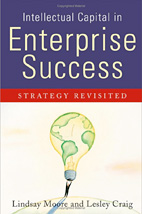Trade secrets can often be used to protect company knowledge and invention in instances where patent protection is either not desirable or available. For example, when trade secrets are viewed as an alternative to patent protection they are commonly invoked in instances where the 20 year life of a patent isn’t deemed to be sufficient, or where the knowledge should never be made public (cf. the famous Coca-Cola recipe).
What is Knowledge Management?
Peter Drucker, the great patriarch and founder of management as a discipline, famously coined the term “knowledge workers” during the mid-twentieth century. “Knowledge workers” were the people who were being paid to think, to work with their brains instead of their hands. Fifty years later, such “knowledge workers” have become the lifeblood of our economy, and are approaching 60% of all workers in the United States.
Intangible assets, intellectual capital or property? It does make a difference
In modern discussions regarding the value of intellectual property, terminology can often become confusing. To prevent misunderstanding, it’s important to differentiate between “intangible assets,” “intellectual capital” and “intellectual property.”
The Possibilities for Patenting Supplement Formulations (PDF)
Intellectual property, and in particular a patent, is critical to protecting product formulations. Patents are the ‘holy grail’ of such formulations, and if a company owns a strong patent it has a limited monopoly in the marketplace that allows it to prevent competitors from copying or otherwise trading on its recipe or formulation for the term of that patent.
Intellectual Capital and Intellectual Property
How does traditional “Intellectual Property” fit into the modern discussion surrounding the value and practicality of “Intangible Assets,” “Knowledge Assets,” or what has come to be known as “Intellectual Capital?”



 As the knowledge-based economy expands, the companies and individuals that possess intangible intellectual assets, such as intellectual property, will need specialized expertise, strategic thinking, legal experience, and the wisdom necessary to manage intellectual assets.
As the knowledge-based economy expands, the companies and individuals that possess intangible intellectual assets, such as intellectual property, will need specialized expertise, strategic thinking, legal experience, and the wisdom necessary to manage intellectual assets.